As I said countless times before, cats are curious creatures, and one of their biggest curiosity is tasty human foods, wherever they can find them. But some human foods can be harmful, toxic, and even lethal to cats.
Human food that’s been left out on the table, on the side counter, in the sink, or still hot on your stove is suddenly a must-have in your cat’s eyes, especially if it smells enticing. Cats will paw your food, steal your meat chunks from the plate when you are not looking, put their paws in unattended drinks then licking their toe beans like a posh little expert. Cutely begging for food is now one of the special abilities a cat can possess, that sometimes gets them rewarded with a taste of what you are eating, even if they don’t even like it in the end.
We all know dinner with a cat looks like this.
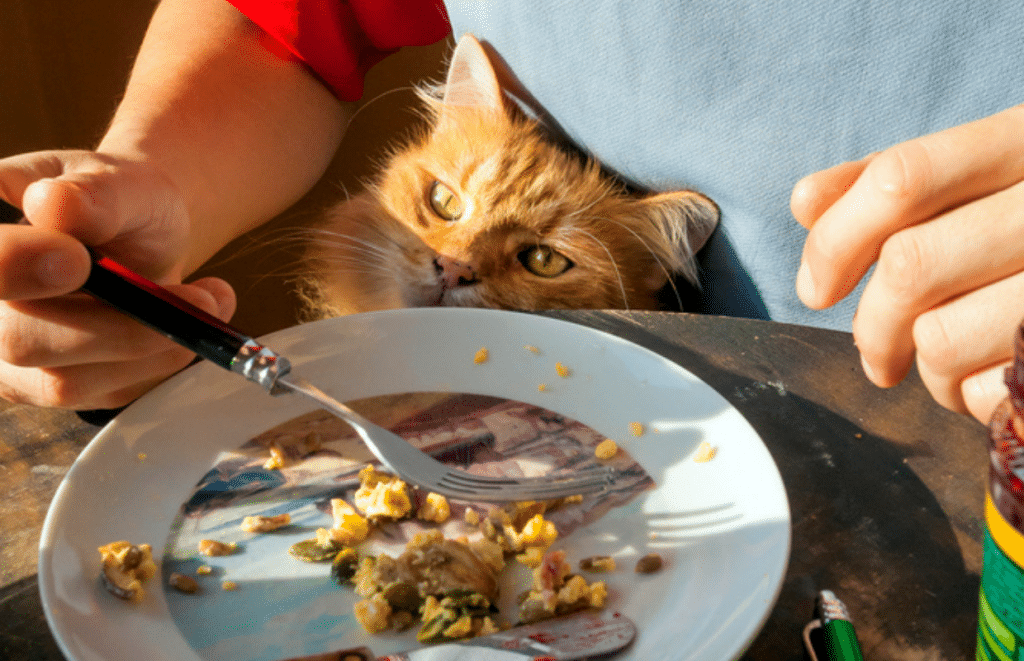
But before you give your cat a taste of your food, make sure it does not contain any of the foods and ingredients listed below, or they can make your cat very sick.
In this article, you will find ALL the harmful human foods to cats and why they are so dangerous for our feline friends, plus some human food cats are safe to eat, but in moderation.
15 Unsafe human foods for cats
Although some human foods are safe for cats to eat, felines should not consume them in large amounts because they are not complete and balanced foods for cats and they will lack the protein, fats, vitamins, and minerals necessary for a healthy cat diet.
Kitties should not ingest food that contains preservatives, artificial food dyes, carbohydrates, and vegetables, as cats lack the enzymes to digest them being obligate carnivores. Some human foods contain substances that can cause severe problems with your cats’ digestive and nervous systems.
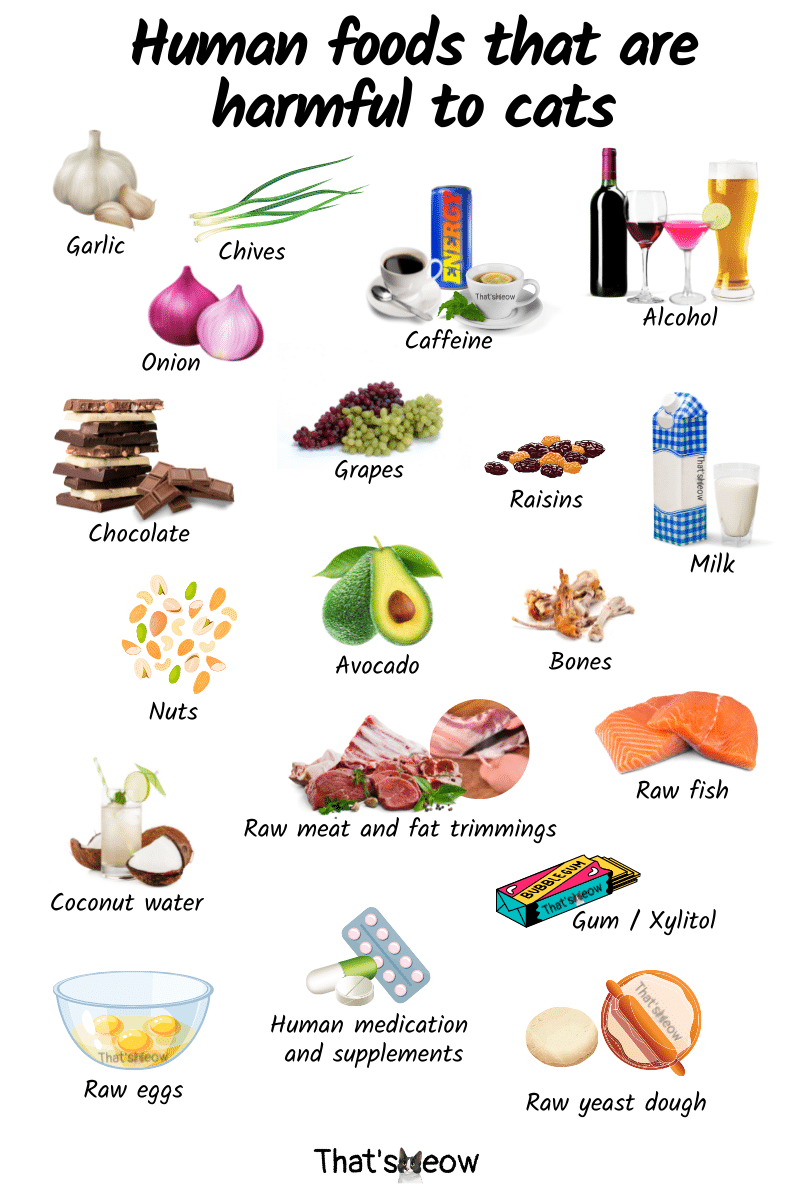
Here is a comprehensive list of the most common human foods that are toxic, poisonous, or harmful to your cat:
- Chocolate
- Alcohol
- Yeast dough
- Caffeine
- Onions and garlic
- Grapes and raisins
- Raw fish
- Raw meat and fat trimmings
- Bones
- Raw eggs
- Milk
- Xylitol
- Nuts
- Avocados
- Coconut water
Additionally, you should not let your cat eat too much tuna or dog food as even though they are not harmful to cats, they do not contain the nutrients your floof needs to have a healthy life.
And I didn’t include it in the list above as it is not food, but you should NEVER let your cat ingest human medicine!
There are however some human foods cats can safely eat but in moderation.
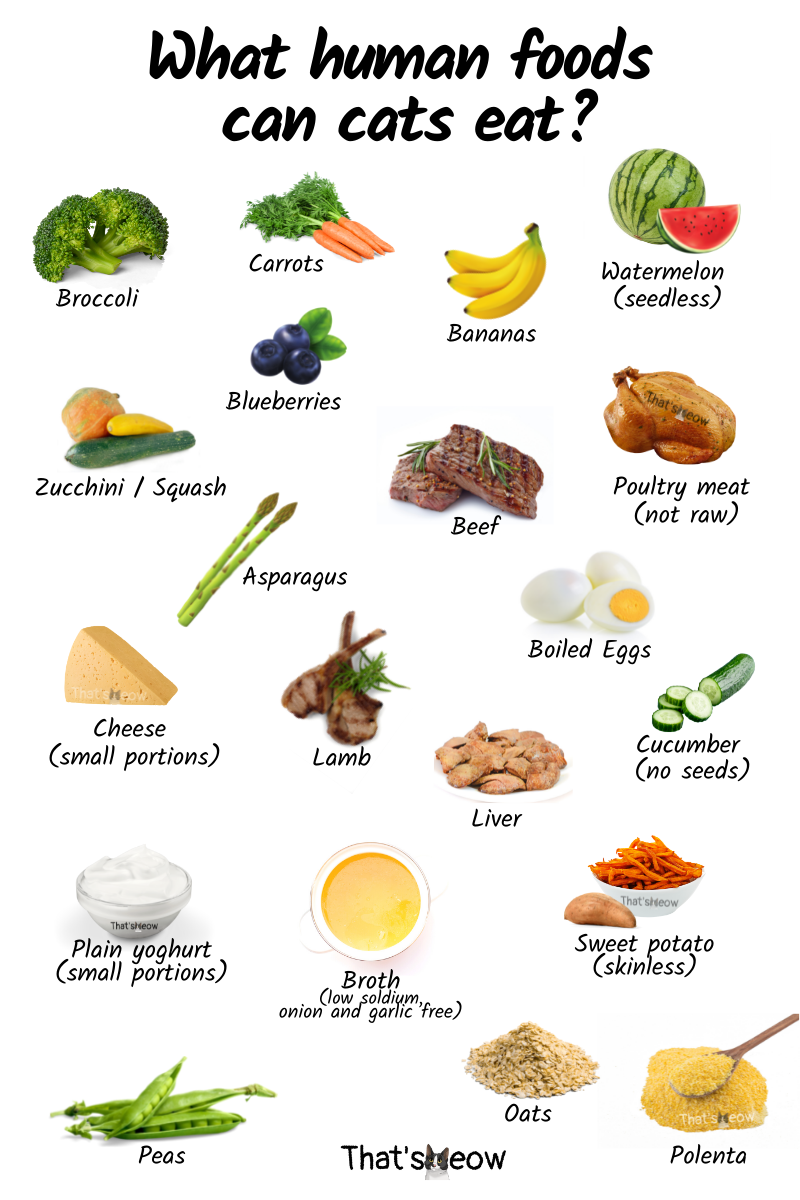
We answered some questions about why these human foods are dangerous to cats.
Can cats eat chocolate?
No. Cats should never eat any type of chocolate whether black, white, dark, or unsweetened, although the risk of eating baking and dark chocolate is higher than eating milk chocolate or white chocolate. Why?
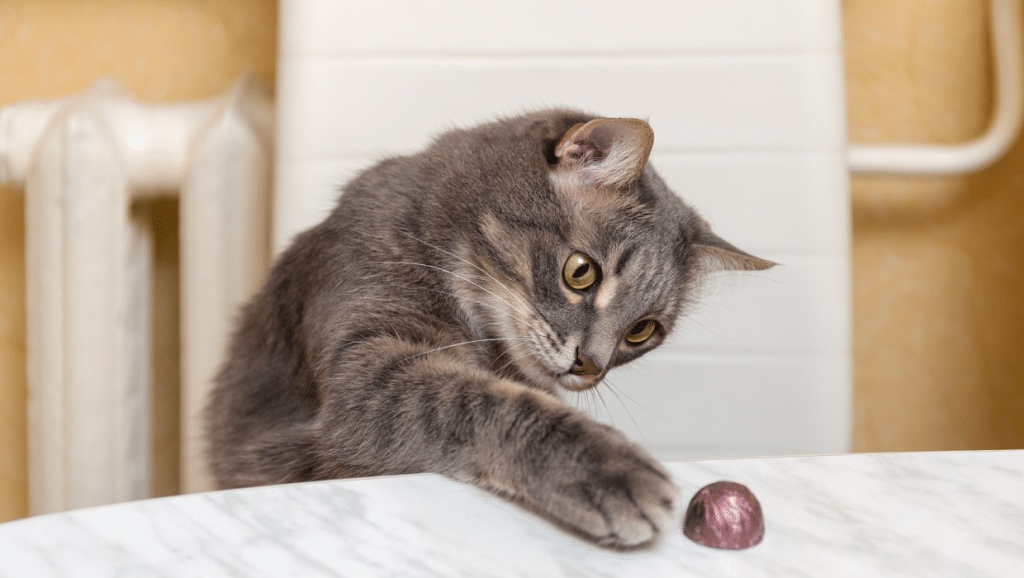
All chocolate types contain the primary methylxanthines theobromine and caffeine, toxic substances that can lead to life-threatening cardiac arrhythmias (irregular heartbeats), central nervous system dysfunctions, and even death in cats, but theobromine is found in higher amounts in darker and unsweetened chocolate.
Find out all the dangers of chocolate toxicosis in our article: Is chocolate bad for cats?
Can cats have alcohol?
No. Pets should not have any alcohol whether wine, beer, or anything their owners like to consume. Depending on the amount ingested, alcohol poisoning can cause all sorts of problems in cats from vomiting and diarrhea to disorientation and difficulties in breathing, intoxication, severe liver and brain damage, coma, and death.

Alcohol is very dangerous to cats because it’s easily absorbed by the body, and even small amounts like 1 teaspoon, can seriously hurt or kill your cat. Keep all alcohol like beer, wine, and spirits away from your cat, and also be very mindful of foods containing alcohol like wine vinegar, certain marinara sauces, rum-soaked cakes, wine-flavored cheeses, some brands of Dijon mustards, chocolate truffles filled with liquor, and raw yeast dough.
If you are a responsible pet owner, please think again before you consider giving alcohol to your pet just because it’s fun!
It is crucial to contact a vet if you believe your cat has consumed alcohol.
Can cats eat uncooked yeast dough?
No. Raw yeast dough is not safe for cats to eat as it will rise and ferment in your cat’s stomach, releasing alcohol and CO2 (carbon dioxide) and expanding your cat’s stomach in the process. The stretch in the stomach can be painful and depending on the amount ingested can cause rapture in the stomach or intestines and of course alcohol poisoning mentioned above.
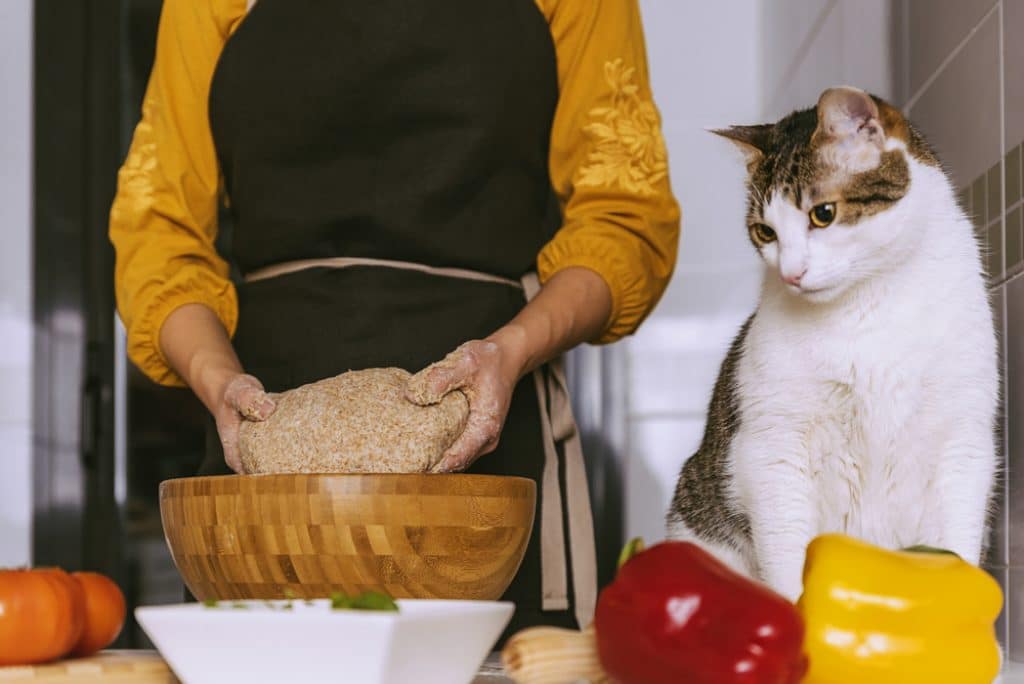
Is coffee toxic for cats?
Yes, coffee is toxic for cats, more exactly the caffeine in coffee is toxic for cats in large amounts. A few licks of coffee or tea won’t kill your cat, but from 100 to 150mg of caffeine per kg of your cat’s weight will be lethal. Drinks like coffee, tea, Coca-Cola, and energy drinks consumed in large quantities by your cat can lead to caffeine poisoning causing restlessness and agitation, rapid breathing, heart palpitations, and muscle spasms. Caffeine can also be found in chocolate.
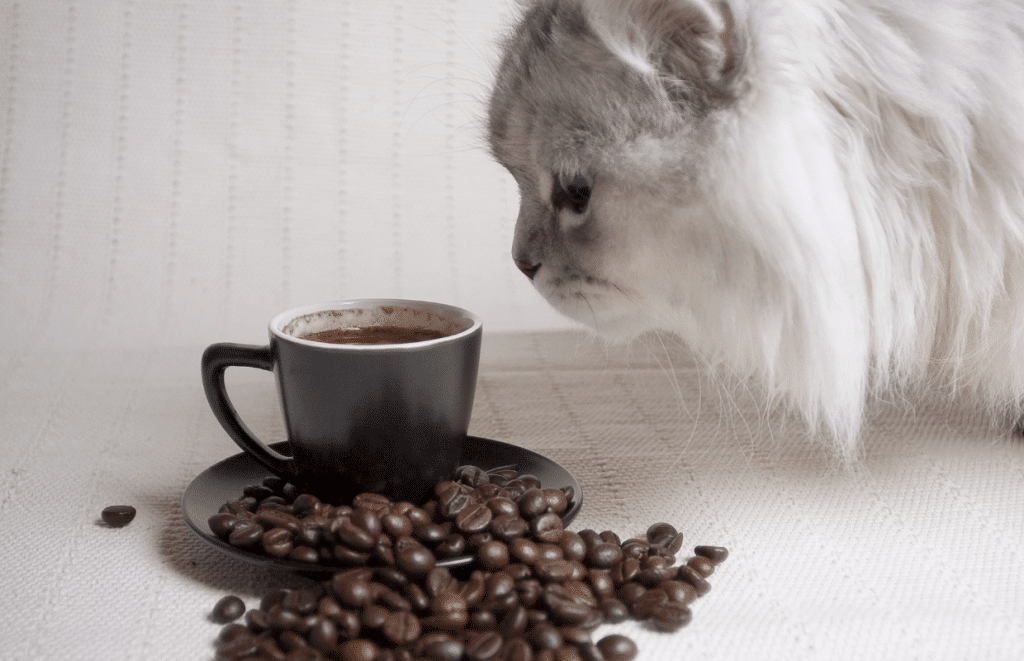
There is 80 to 135 mg of caffeine content in 200ml ( 7 US fl oz) of brewed coffee, 115-175 mg of caffeine in 200ml of drip coffee, and 45 to 60 mg of caffeine in an espresso shot.
Can cats eat onions and garlic?
No. You should not let your cat consume any member of the allium vegetable family like onion and spring onion, scallions, garlic, leeks, chives, and shallot because they can be toxic and lead to anemia, low blood pressure, respiratory issues, and even death.
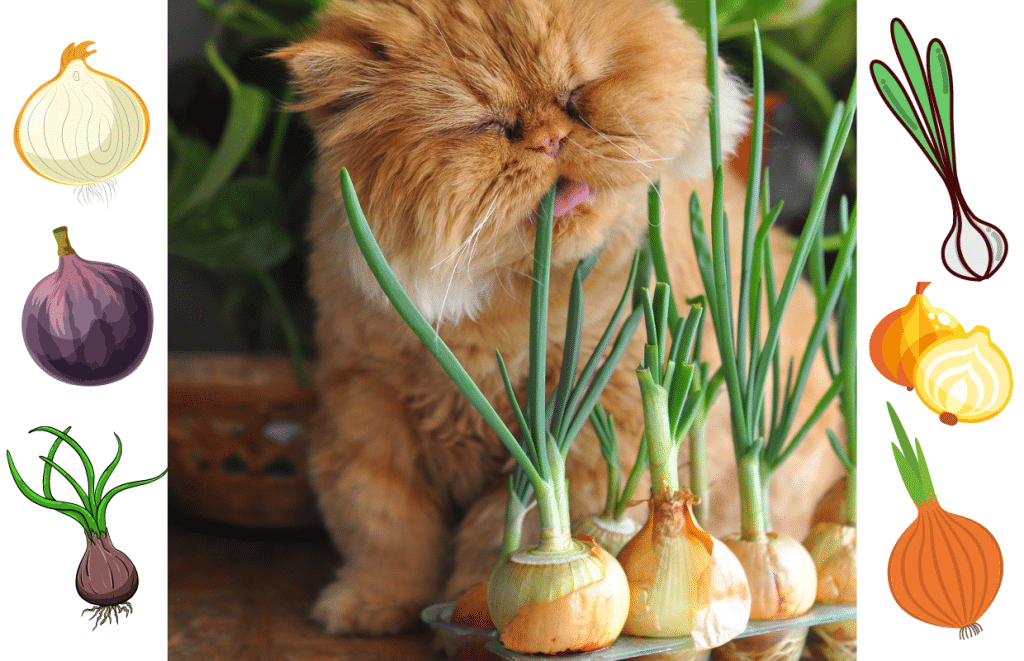
Even though having a few licks from a pasta sauce or any other product that contains raw, powdered, cooked, or dehydrated onions or other allium vegetables won’t harm your cat, eaten in a large quantity compared to your cat’s body weight or in smaller amounts but on regular basis can cause toxicity resulting in gastrointestinal problems like nausea, drooling, oral irritation abdominal pain, vomiting, and diarrhea.
Furthermore, onions and garlic contain sulfoxides and disulfides which can damage your cat’s red blood cells. The red blood cells are carrying oxygen in your cat’s body, and their crushing will result in symptoms of anemia including pale gums, lethargy, increased heart rate, weakness, increased breathing, fainting, and death.
Chemicals found in some of the members of the onion family also dilate the blood and prevent the blood from clotting, causing low blood pressure and relaxing the heart muscles weakening, even more, the oxygen delivery to your cat’s organs.
Can cats eat grapes and raisins?
No. Grapes, for unknown reasons yet, cause acute renal failure in some cats, not only in dogs. The toxicity reason remains unnamed, but, it is suspected to be contained by the fruit’s flesh, not the seeds. Any products made from grapes like raisins, sultanas, and currants have the same effect. Clinical signs include oliguria (not so much urine), or anuria (the failure of the kidneys to produce urine), lethargy, nausea, vomiting, diarrhea, anorexia, and dehydration.
Even a small amount, as much as eating more than 2 raisins can make a cat very ill, so if your cat ate raisins, call your vet as soon as possible. You can reverse the start of an acute renal failure, but waiting for more than 24 hours may be too late!
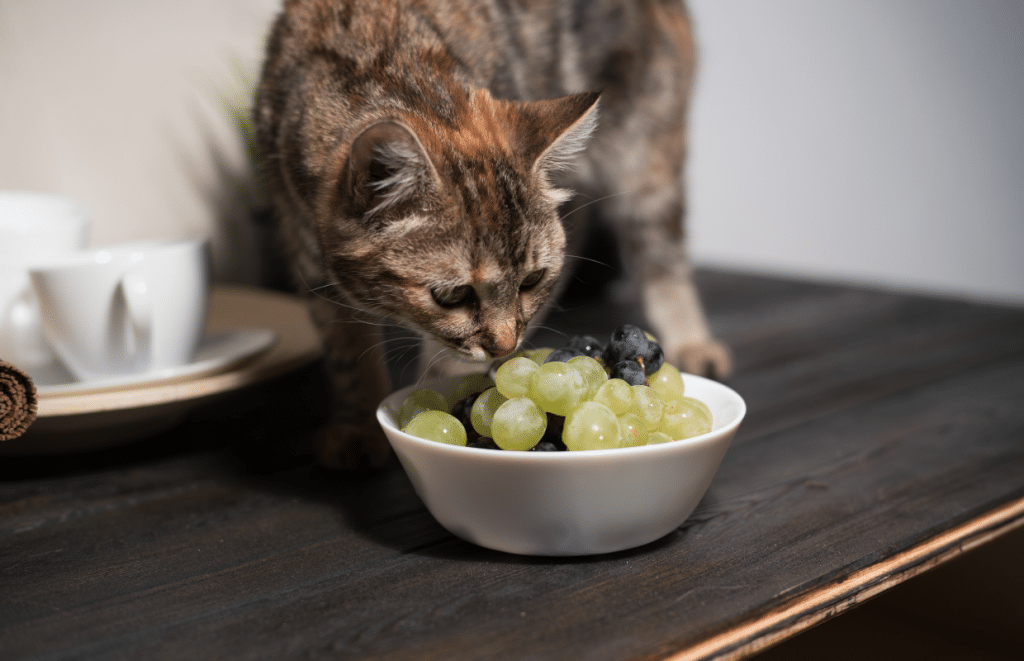
Between 6 to 12 hours from the ingestion of grapes or raisins, the affected pet will start vomiting or develop diarrhea. Other signs may develop in the next 12 hours like abdominal pain, weakness, dehydration, lethargy, anorexia, and shivering. After 24 hours, signs of oliguric or anuric renal failure appear which is the cause of death or euthanasia in dogs, and so possible also for cats.
Some cats are not affected by ingesting grapes or raisins and can tolerate eating them, but it’s best to keep them out of your cat’s paw reach and don’t risk developing any kidney problems.
For a dog, of an estimated weight of 18lb (8.2 kg), eating 4-5 raisins was deadly. So if cats are affected in the same way as dogs are, eating up to 3 raisins can be fatal for an average 10-pound adult cat (4.5 kg).
My Dot, for some reason, loves to eat raisins. She used to pick them out of my snack bowl specifically and eat them, leaving out all the other snacks from the bowl. Don’t worry, I didn’t let her have any raisins since I found out they are so dangerous to cats. But, she did eat about 2-3 raisins at one time, which could have been deadly for her as she was weighing only 5 – 6 pounds (2 – 2.7kg) at that time. She did not have any symptoms.
Can cats eat raw fish?
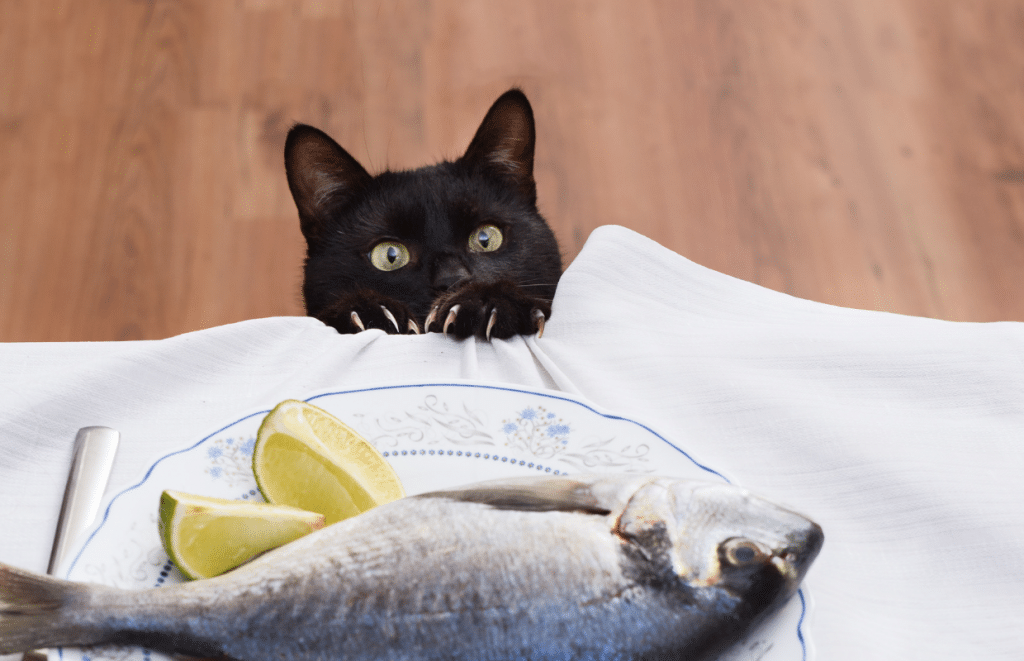
Yes, cats can eat raw fish, but it’s highly advised not to. Firstly it is unsafe for cats to eat raw fish because it carries harmful bacteria to your cat’s stomach including Clostridium, E. Coli (Escherichia coli), and Salmonella which can cause long-term gastrointestinal diseases. Secondly, most fishes contain thiaminase an enzyme that breaks down the thiamine (Vitamin B1) from your cat’s body. As you’ve learned from our cat food article, cats can not make thiamine on their own, and without it, they will develop gastrointestinal issues, loss of appetite, and neurological problems. Therefore, the thiaminase from raw fish is an antinutrient when consumed by your cat, exposing your kitty to unnecessary risks.
Here is a video taken by a vet took of a cat suffering from thiamine deficiency that you should see before you consider putting your cat on a fresh fish diet.
If you want to give fish to your cat, we advise you to cook it first, preferably without any artificial flavorings, herbs, oils, and spices that can upset your cat’s stomach. Also, we found some fish that are thiaminase-free which you can safely offer to your cat when cooked:
- Salmon
- Bass (Largemouth, Northern Rock, and Northern smallmouth)
- Atlantic Cod
- Eel
- Trout ( Sea, Lake, and, Rainbow)
- Flounder
- Haddock
- Mackerel (Atlantic)
- Mullet
- Perch
- Pike
- Halibut
- Sole
Unfortunately, America’s most consumed fish, Tuna, is known for containing thiaminase, as well as Anchovies, White Bass, Bream, Catfish, Herring, and Sardines.
Can cats eat raw meat?
Yes, cats can eat raw meat if it has been frozen or freeze-dried and then thawed. Don’t give raw meat to your cat, if you just bought it from the butcher by yourself, and haven’t cooked it yet. Raw meat can contain bacteria that cause food poisoning in cats as well as humans and some of them like E. Coli and Salmonella are even transmissible to humans. Symptoms of the poisoning can include vomiting, diarrhea, and lethargy.
If you think of switching your cat to a raw or homemade raw diet find out its pros and cons here.
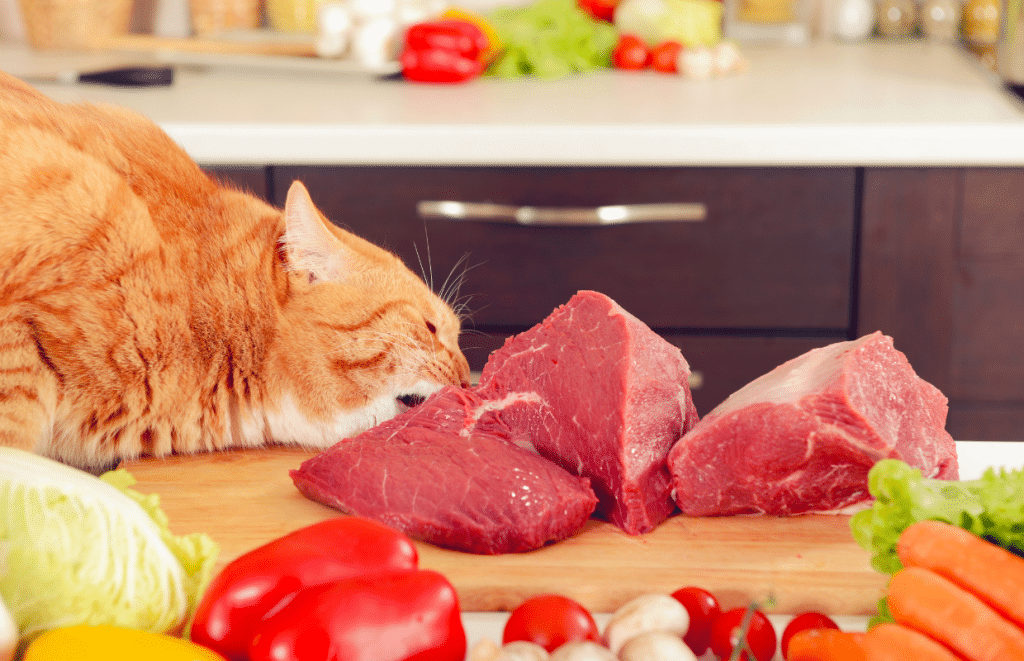
It is safe to offer your cat commercial raw cat food, as it is bacteria-free and complete and balanced for your cat.
Can cats eat fat trimmings?
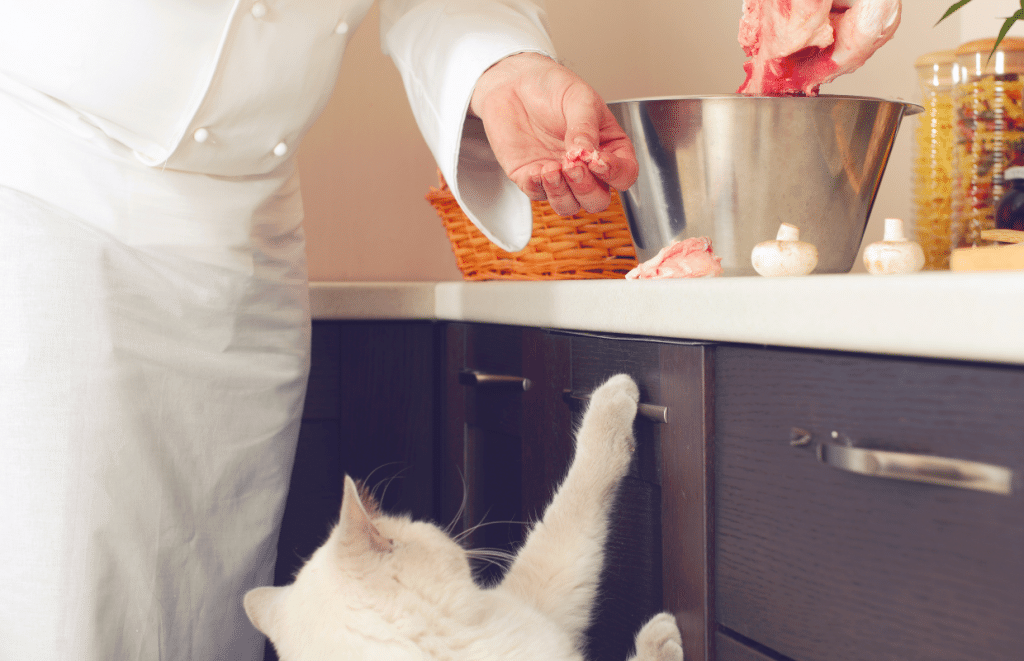
No. Fat trimmings cooked or uncooked are bad for your cat and are often associated with an upset stomach, vomiting, and diarrhea. Fat trimmings are not to be used as treats for your cat every time you have some leftovers on your plate after dinner, as your cat can develop pancreatitis. A high-fat regular diet is one of the main risk factors for developing pancreatitis in cats. The more fat your cat eats the harder her pancreas works, and the amount of fat in her blood increases, leading to obesity and eventually developing acute or chronic pancreatitis.
Can cats eat bones?
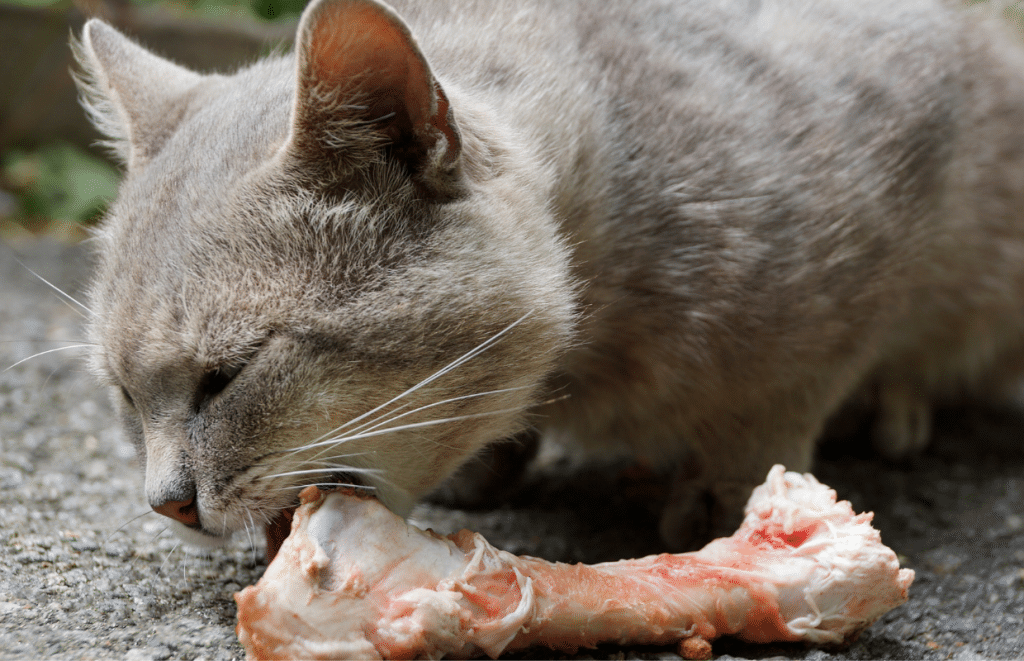
Yes but not cooked bones. Although bones are not harmful to your cat nutrition-wise, cooked bones pose a potentially different physical harm to your cat. Cooked bones especially, can choke a cat, and get stuck in your cat’s mouth or throat. Cooked bones become fragile and splinter more easily and they can internally injure your cat’s digestive tract by cutting their way through your cat’s stomach.
On the other hand, raw bones are a good health benefit for your cat’s diet, especially if your cat has a calcium deficiency. Raw meaty bones can be given to your cat if they are big enough to don’t be swollen whole, and the best choices are raw chicken necks, wings, drumsticks, and raw lamb shanks. You can also add ground bones to your cat’s food to avoid any potential internal damage, or offer your cat a bone broth for the benefits of collagen.
Can cats eat raw eggs?
No. Cats should not eat raw eggs. And not just because of the risk of Salmonella (as just one in 20,000 raw eggs contains Salmonella) or E Coli as healthy adult cats are rarely affected by E. Coli bacteria, only kittens, senior cats, and cats with a compromised immune system can get ill from E Coli. The main reason cats should not eat raw eggs is that raw egg whites contain avidin, an enzyme that decreases the absorption of biotin (Vitamin B7). Biotin maintains the healthy skin and coat of your cat, and so, by regularly giving your cat raw eggs, you may cause your cat to have skin issues or a poor coat.
Can cats eat milk?
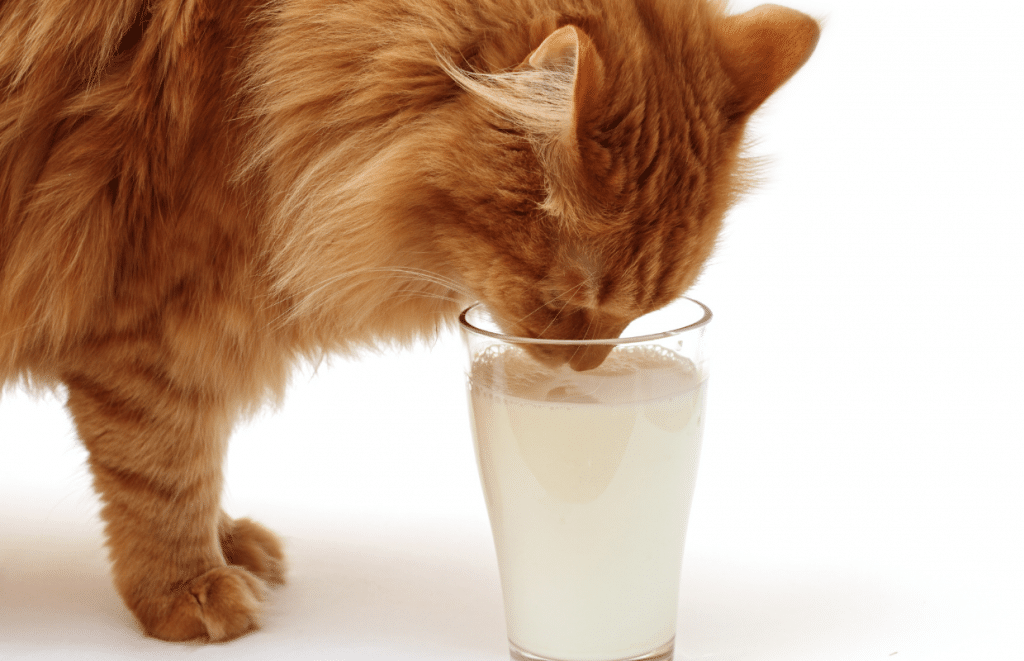
No, cats can’t have milk. Adult cats lack the lactase enzyme that processes the lactose in milk, so adult cats are lactose intolerant. Feeding your cat dairy products can cause vomiting and diarrhea.
Only kittens are okay to drink milk, preferably goat’s milk, because they are already exposed to lactose from their mother’s milk for a few weeks and they can handle it with no digestive issues. Although it is recommended to let kittens have only their mother’s milk. Additionally, you can give your kitten milk formula from the pet store, in case of having lost its mother.
Can cats eat Xylitol?
Cats should not eat Xylitol, even if it’s not as dangerous as it is for dogs. Xylitol is a naturally occurring alcohol sugar found in many fruits and vegetables and is used as a sweetener in a lot of sugar-free foods, chewing gum, mints, candy, and some baked foods.
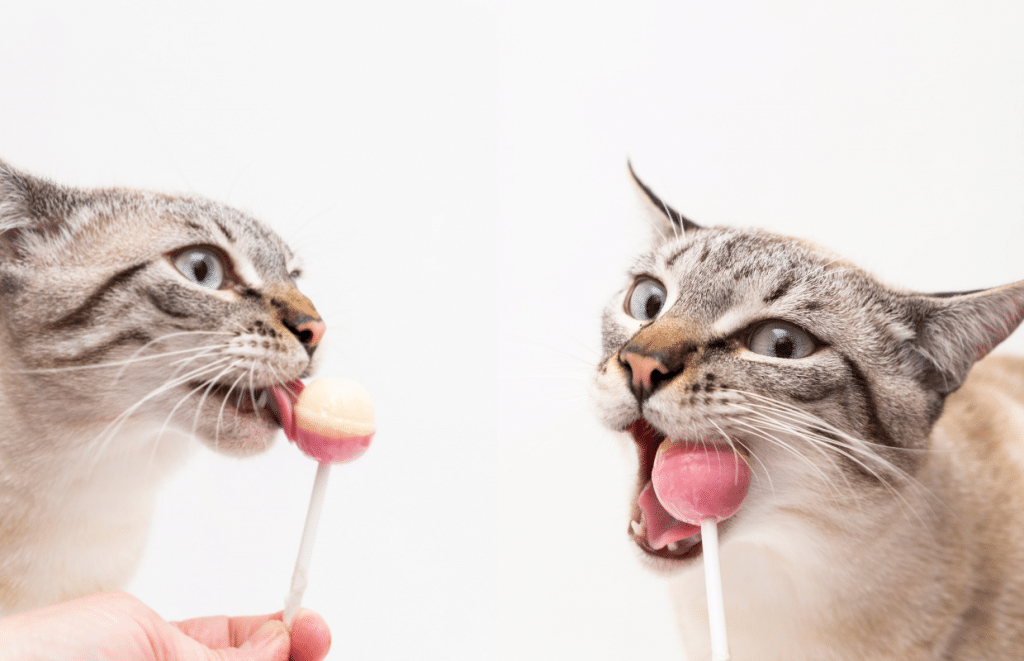
In cats, Xylitol intoxication has not been reported, but if I’d have to guess, if consumed too much, the sugar alcohol can get fermented by gut bacteria and lead to gas, bloating, and diarrhea. But depending on your cat’s health and even body weight, it could also lead to intoxication and possible liver failure from the rise of insulin levels in the blood and the result of hypoglycemia, especially if your cat is diabetic. Ingesting more than 0.5g of Xylitol per kg of body weight highly increases the risk of developing liver toxicity in cats. And even though your cat might not be interested in eating chewing gum, she might want to lick some enticing creamy food sugar-free and sweetened with Xylitol.
On the other hand, in dogs, Xylitol can cause a serious drop in blood sugar levels from the insulin spike, which can lead to seizures, convulsions, and liver failure causing death, with the first signs of intoxication showing loss of coordination, vomiting, and lethargy.
Can cats eat nuts?
No. Cats can’t eat nuts, especially Macadamia nuts which have been proven toxic to pets, but their exact toxicity is unknown just like in grapes. Other nuts, like walnuts or pecans, can also be toxic to cats. The symptoms of toxicity include vomiting, lethargy, hypothermia, and tremors. Not to mention nuts are rich in fats and oils which is another cause of an upset digestive system. But I’ve never seen a cat interested in eating nuts, have you?
Can cats eat avocados?
Cats can eat a small amount of avocado flesh, but should not the skin (or the pit) as they contain persin, a substance mildly toxic to cats and dogs. Cats should not eat avocados because it is high in fat and they can upset your cat’s stomach and cause vomiting, diarrhea, or obstruction of stool. Avoid giving avocado to cats with preexisting gastritis and pancreatitis conditions or you can risk the return of pancreatic inflammation in the affected cats.
So if your cat is interested it is safe to give it a small taste of avocado flesh, no more than a tablespoon mixed in their food or just like that, but you should NEVER let your cat eat guacamole, as it can contain toxic ingredients like onions and even garlic.
Can cats eat coconut?
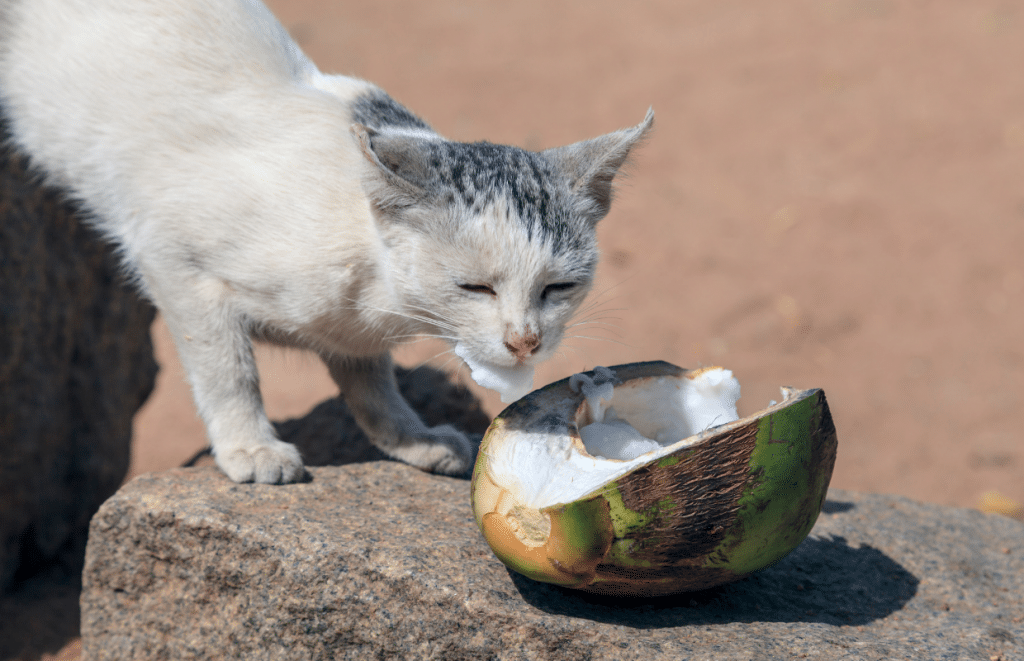
Coconut is not toxic to cats but offered regularly is unhealthy. Coconut flesh has a high plant-based fat content and can cause diarrhea, as does coconut milk and coconut oil, and often given to your cat and can lead to weight gain, fatty liver disease, and pancreatitis. Coconut water on the other hand, although it’s not high in fat, contains too much potassium for your cat and can cause hyperkalemia, a toxic excess of potassium that acidifies your cat’s blood and can cause heart damage. You should not give coconut products to cats with sensitive stomachs, diabetes, or other health conditions like liver or kidney diseases. ASPCA recommends not to let pets drink any coconut water.
Coconut oil can be used differently to benefit your cat. Because of the vitamin E and high-fat content, coconut oil can be a good detangler to soften knots and provide a healthy coat for your cat, or it can be used on irritated skin having a soothing and moisturizing effect for felines.
If your cat is very fluffy and prone to getting knotted fur or mats, we found the best 8 Cat detangler sprays of 2022 to help you brush your cat hassle-free!

Can cats eat tuna?
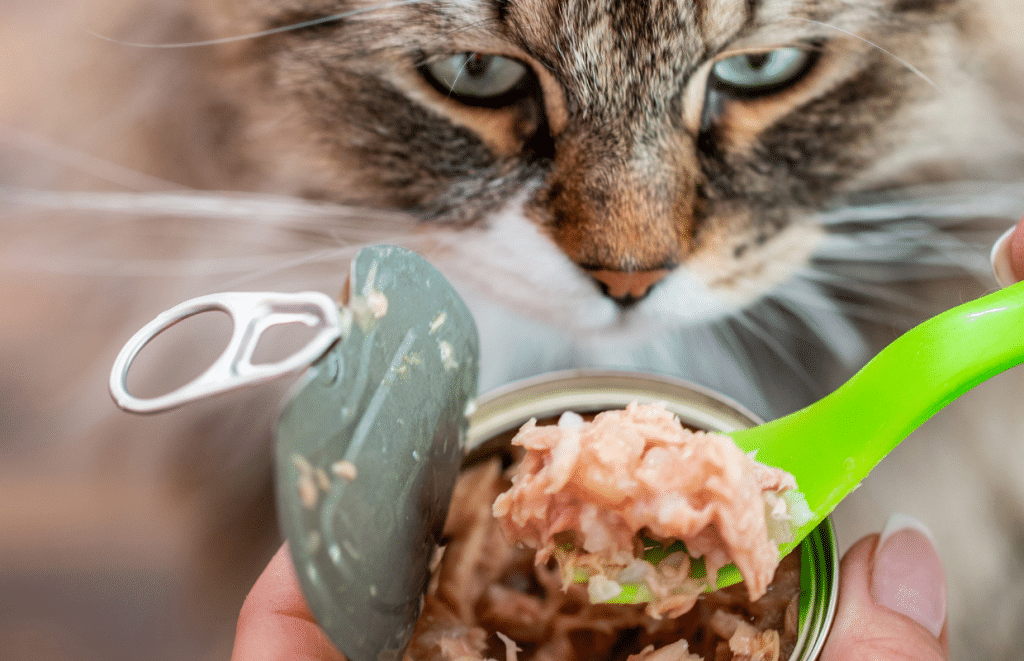
Yes, cats can eat tuna, but not on a daily basis, and preferably not raw. A regular tuna diet is harmful to your cat because it does not contain all the nutrients your cat needs and can lead to malnutrition. Raw tuna contains thiaminase and fed regularly to your cat will cause thiamine deficiency and possible mercury poisoning. You can safely offer cooked tuna to your cat as treat from time to time.
Can cats eat dog food?
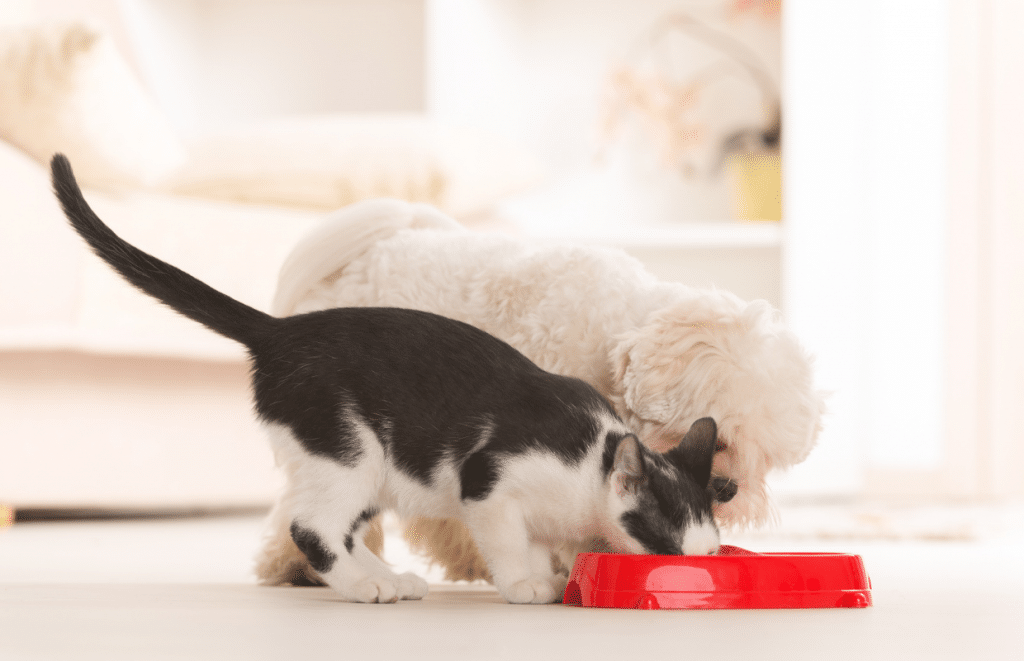
Dog food it’s not poisonous to cats and occasional snacking on dog food won’t harm your cat, but do not offer dog food to your kitty as a cat food replacement. If your kitty only eats dog food it will cause your cat to become severely malnourished because dog food does not include the high protein content, vitamins, minerals, taurine, and fatty acids a cat needs in her everyday diet.
Can I give my cat painkillers?
No. You should never give your cat human medication. Human medication even in small doses can be extremely harmful and toxic for your cat. Eating a drug prescribed for human use is the most frequent cause of poisoning in cats, even just common pain relievers like ibuprofen or paracetamol can be deadly for your cat.
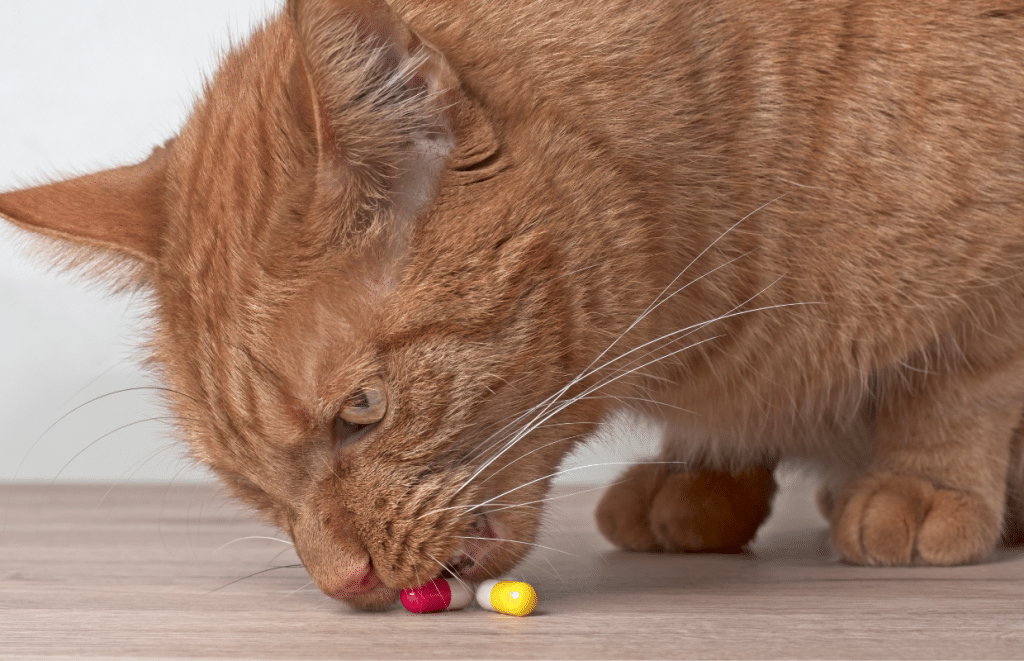
The most harmful and potentially poisonous human drugs for cats are:
- Acetaminophen ( Tylenol) – just one tablet can damage a cat’s red blood cells
- Paracetamol, Ibuprofen, and other anti-inflammatory pills (Advil, Aleve, and Motrin) – one or two tablets can cause serious stomach and intestinal ulcers in cats, and even kidney failure.
- Aspirin
- Effexor, Prozac, and other antidepressants can cause serious neurological problems like sedation, incoordination, tremors, and seizures.
- Birth control pills
- Xanax, Benzodiazepines, and other sleep aids
- Cholesterol medication
- Thyroid hormones
- Attention Deficit Disorder and ADHD medication such as Prozac, or Lexapro
- Beta-Blockers
Keep poisonous foods out of your cat’s paw reach!
To prevent your cat from eating any harmful and toxic human foods for felines, we gathered some useful tips for you:
- Store the harmful foods in sealed storage containers.
- Keep the dangerous foods for cats out of your kitty’s reach in pet-proof cabinets if necessary.
- Teach your cat to don’t jump on the counter or tables while you are cooking or eating.
- Do not feed your cat any table scraps and leftovers.
- Make sure there are no dirty dishes left in the kitchen sink or food that your cat can lick or eat
- Keep garbage bins covered.
- Give safe human foods to cats only as a treat and not very often to prevent any stomach upset or nutritional imbalance
- If you feed raw food to your cat make sure you follow all the safety guidelines and ask for your vet’s advice.
What should you do if your cat has eaten poisonous food?
If you think your cat has consumed any toxic food for felines, or you saw your cat eating something poisonous, immediately call your personal vet for an appointment or any other vet close to your residence if your cat has ingested a big amount of a harmful substance or food.
If possible, take with you the product your cat has ingested or the packaging to help the vet determine a more precise diagnosis, having had a look at the ingredients listed on the label.
If your vet is out of working hours, you can call the ASPCA 24/7 Animal Poison Control Center at phone (888) 426-4435 at any time in case your local vet doesn’t do emergency calls or the Pet Poison Helpline at 855-764-7661, but be prepared as a consultation fee of 65$ might apply.
In some cases, ingesting a small amount of dangerous food might not cause a serious health problem, but a big amount might require urgent treatment such as intravenous fluids, blood tests, and monitoring of the organ functions until the symptoms pass.
Conclusion
Any food that is not specifically formulated for cats, which are obligate carnivores, can cause digestive system issues like vomiting, diarrhea, loss of appetite, and food poisoning, so make sure you keep all your dangerous human foods out of your cat’s paw reach and before you give any food to your cat to try or snack on make sure it’s safe to eat by felines. Better to be safe than sorry.
If you know of any other human food dangerous to cats that we should know about and we need to add to our list please let us know in the comments below, or feel free to contact us. We would love to hear from you.
Stay pawesome!






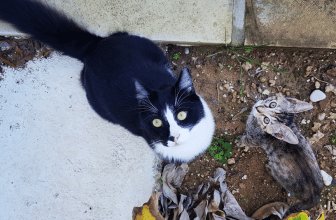
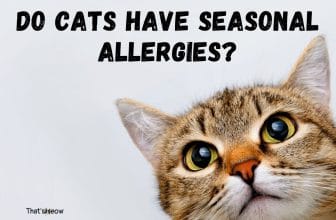
I boil or fry boneless skinless chicken breast for my cat, chop it up and refrigerate it. I give her a small amount of it with canned and dry food daily mixed. Is this harmful for her to have chicken daily?
Dear Elvira,
Thank you for your comment.
As long as the chicken is cooked and not raw, and refrigerated for no more than 3 to four days then it should be a yummy additional treat besides the canned and dry cat food. Raw chicken is also good sometimes but it needs to come from a trusted source and stored properly to not be contaminated with any harmful bacteria. I am sure your cat loves the chicken treats every day. You are a very loving cat parent.
How can you say milk is harmful to cats????? Both of my cats lick up milk
and they are good after doing that, even the next day they are meowing and running around and playing just fine.
Hi Heather,
Thank you for your feedback, it is very important for us, especially when things like this can be confusing.
It is known from old times that owners give milk to their cats thinking it is good for them, but it’s just a misconception, and of course cats like it, after all, it is milk!
But, Yes, I can strongly say that milk is harmful to cats because cats can not digest milk anymore once they grow up! Especially cows milk. They are lactose intolerant and depending on the amount of milk they consume, they can get an upset stomach or other digestive issues like vomiting, diarrhea, and stomach pain. Why?
Cats do not have the lactase enzyme in their intestines to digest the sugar found in milk (lactose), so even if not all cats get sick from milk, why risk it?
Vets agree that foods containing lactose (milk, yogurt, cheese) are not necessary for the diet of adult cats.
If you still don’t believe me, pick up your phone and ask your own vet. I am sure they can give you a more proper understanding of cat nutrition.
Letting a cat lick some milk from time to time won’t probably disturb their digestion much, but giving a cat “milk with bread” as their main food every day definitely will.
I hope my answer helped you.
Have a beautiful day.